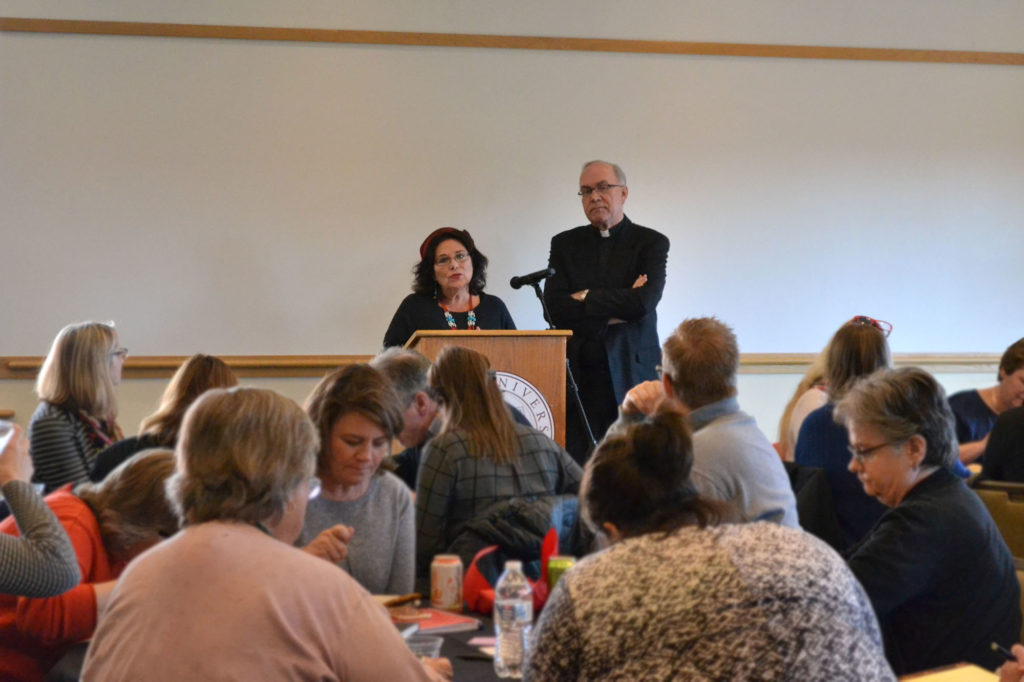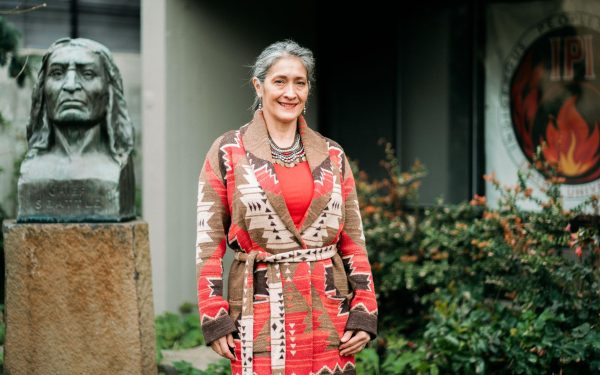Discussion Presents Topic of State of Women in Jesuit Church
Members of the Seattle University community met on Friday for a discussion on the status of women in the Jesuit Church and Seattle U community.
Louis Gaffney and Endowed Chair Jeanette Rodriguez presented the discussion which included about 40 Seattle U faculty and staff. This discussion was responding to a document entitled “Jesuits and the Situation of Women in Church and Civil Society.”
This document was written by a group of Jesuits, the General Congregation 34 which included Seattle U President Fr. Stephen Sundborg, S.J. and Professor in Residence Fr. Pat Howell. They had an audience of other Jesuits, as opposed to laypeople who are not in the clergy, in mind. The document highlights the dominance of men in general, and specifically within the Jesuit church.
Participants included staff and faculty from Information Technology Services facility services, marketing and the Arrupe House, with many more departments represented as well. Sundborg also joined the discussion to help put the document into context within the larger Jesuit community.

Professor Jeanette Rodriguez and Father Sundborg starting the conversation about women’s place within the Church and civil society.
Rodriguez later spoke of the need for discussions such as this.
“The point is, I’m trying to get people to be creative about what we can do, what we need to do,” she said. She also spoke of the need to be attentive and refrain from criticism in these kinds of discussions.
Sundborg gave a brief overview of the document in question, noting that there had previously been no document on the state of women in the church. He also noted that the document is not meant to speak for women, but instead addresses how Jesuits should collaborate with women and acknowledges the contributions of women within the Catholic Church.
At the same time, Sundborg recognized the limits of the document, noting that Jesuits are forbidden to try to change the teachings of the Catholic Church, which include the policies on ordination of women.
From there, Rodriguez asked the participants to speak honestly and respectfully, encouraging them to think about what they could be doing to reach the goals discussed in the document. She challenged the participants to generate ideas for concrete changes they could make in their respective departments.
A laywoman and a Jesuit facilitated the individual tables discussion to ensure that each person’s voice was heard. Throughout the discussions, participants wrote down questions to later be answered by Sundborg.
Table facilitators then took turns speaking on which concerns and solutions in particular stood out for their tables. Some, but not all, of the concerns shared included the mobility of women to move up from staff roles, the privilege of speech continuing to be male-dominated, the number of women on the Board of Trustees, the open-endedness of the document in question, the genuine listening to women by men and the issue of women’s ordination. Many tables also mentioned the lack of maternity and paternity leave available for all staff, though some employees, such as faculty members, do have leave available.
To conclude the discussion, Sundborg offered his thoughts and addressed the concerns of the participants. He spoke of his own role in a system of oppressing women, noting that he lived in a self-described “men’s club” with fellow Jesuits and wondered how that affects a man’s ability to listen to women. He also mentioned that Seattle University has lifted its requirement for a president to be a Jesuit, which means that a woman could now be the university’s president—something that he said he could envision in the future.
Sundborg also spoke to the issue of maternity leave, saying that there is currently an effort to expand maternity care to staff in addition to faculty members.
Sundborg closed by commenting on the importance of the discussion itself.
“This very session shows that we have a long way to go in terms of listening to women,” he said.
On changes being made to address the participants’ concerns, Sundborg spoke of the university’s interest in forming a staff council. This would be similar to the faculty’s academic assembly, which consists of elected representatives who speak with the administration on the faculty’s behalf.
“Having a staff council would be an advance, particularly about what are the voices and how are people listened to,” he said, noting that this was important because the staff population is overwhelmingly women.
Rodriguez was pleased with how the discussion went and with the participants’ insights and suggestions.
“A gathering like this where listening was the main objective—to listen and to offer creative, constructive responses to any frustration we might be feeling—I thought it was a really good beginning,” she said.
She added that she quickly heard a desire that the process of discussion between laywomen and Jesuits continue.
Associate Director of the Center for Jesuit Education Jennifer Tilghman-Havens echoed those sentiments.
“I think it was a great start,” she said. “I think my primary hope is that the conversation can continue in other formats about how women’s leadership can be fostered and about in particular what the role of the Jesuits might be in empowering women leaders.”
Catherine Punsalan-Manlimos, Director of Catholic Studies, expressed her own hope for women in the church.
“My hope is that we will move forward from here,” she said. “We’ve been in conversation with one another, but I think having a variety of people in the room at the same time is inspiring us to move to the next step of gathering together to formally enact some of our ideas.”
Sofía may be reached at
[email protected]










